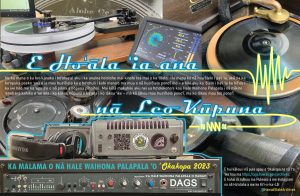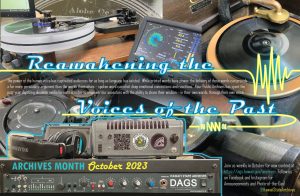Archives Month 2023
We are excited to debut our digitally enhanced recordings that have been tailored for your listening enjoyment using state of the art tools. Our digitization process enhances desired sound elements (vocals and instruments) while reducing undesired audio distortions (hisses, pops, and crackles). The raw, unprocessed archival recordings have been preserved for anyone interested in doing their own audio engineering work to tailor the sound to their liking.
Join us weekly throughout the month of October for new themed content as we celebrate Reawakening the Voices of the Past.
Please join us daily on Facebook (https://www.facebook.com/HawaiiStateArchives/) and Instagram (https://www.instagram.com/hawaiistatearchives/) where we will be featuring records in relation to our theme.
Click on the links below for more information about our Archives Month and to see our virtual exhibitions (updated weekly):
Week 1: Tradition Bearers
Week 2: Voices of Democracy
Week 3: Future Leaders
Week 4: The Public Servant
Week 5: The Drive to 49
October 1-7: Tradition Bearers
The Organic Act of 1900 recognized only the use of English in Hawaiian government, resulting in a dramatic drop in the number of Hawaiian-language Speakers throughout the early 20th century. Through the valiant efforts of many traditional bearers, including Theodore Kelsey and Winona Beamer, the lyrical beauty of the ʻŌlelo (language), Mele (song) and Oli (chant) was preserved for future generations. This week will feature recordings created by Kelsey in the 1920s and Beamer in 1947 to preserve the language and traditions of Hawaiʻi.
The “raw” audio is recorded directly from the medium as is. The “equalized” audio is lightly edited for a better listening experience.
https://digitalarchives.hawaii.gov/browse/parent/ark:70111/4jND
Previously scanned Selections from Theodore Kelsey’s Manuscript Collection: https://ags.hawaii.gov/archives/online-exhibitions/selections-from-the-theodore-kelsey-manuscript-collection/
https://digitalarchives.hawaii.gov/browse/parent/ark:70111/4jQJ
October 8-14: Voices of Democracy
The First Amendment prohibits the Government from infringing upon an individual’s right to speech, religion, and free assembly. Yet in the aftermath of World War II and the rise of Stalinism in Russia gave rise to McCarthyism; resulting in open attacks on anyone with Socialist or Communist Party sympathies. Even in Hawaiʻi there were attempts to fire public servants with Communist ties; public hearings were held regarding Communist Party associations. This week we present 1947-1950 wire recordings of individuals who stood up for their right to assemble with those of their own choosing and exercised their right to free speech. The Archives does not advocate for any particular political party or belief system, but it does strongly support and defend the right to free speech and access to information. In support of that mission we have digitized the following hearings in hopes that they will inform the current and future generations of the challenges that have existed to exercising those rights.
The “raw” audio is recorded directly from the medium as is. The “equalized” audio is lightly edited for a better listening experience.
https://digitalarchives.hawaii.gov/browse/parent/ark:70111/4jQQ
https://digitalarchives.hawaii.gov/browse/parent/ark:70111/4jQR
Finding Aid: Department of Education, Series 318 Reinecke Dismissal File, PDF page 36 and PDF page 122
October 15-21: Future Leaders
The Archives received thousands of recordings of high school events that were held at Aloha Stadium between 1995 and 2019. These students of yesterday have now matured into the leaders of today. The oldest events from the 1990s and early 2000s VHS tapes are available online, in full, to relive these past glories (and for the keiki to see what their parents were like at their age – “What?!?! No WAY?!?!? Dad was actually COOL????”).
The “raw” audio is recorded directly from the medium as is. The “equalized” audio is lightly edited for a better listening experience.
https://digitalarchives.hawaii.gov/browse2/parent/ark:70111/4jSC
October 22-28: The Public Servant
This week is a very special one for us at the Archives. Colonel Curtis Piʻehu Iaukea was the quintessential public servant, having served two monarchs, twice as Governor, a Senator, and Chairman of the Board for the Public Archives – along with many other offices. This week we are excited to share 1910s Edison Cylinder recordings of Col. Iaukea, along with a 1937 shortwave radio interview that was recorded onto an aluminum phonographic record; and over 7,000 pages of his personal manuscript collection.
The “raw” audio is recorded directly from the medium as is. The “equalized” audio is lightly edited for a better listening experience.
https://digitalarchives.hawaii.gov/browse/parent/ark:70111/4k01
Ref No. M70.01-4-01a, Track 1: https://digitalarchives.hawaii.gov/item/ark:70111/4k0Z
Ref No. M70.01-4-01b, Track 2: https://digitalarchives.hawaii.gov/item/ark:70111/4k10
Ref No. M70.01-4-01c, Track 3: https://digitalarchives.hawaii.gov/item/ark:70111/4k11
Ref No. M70.01-4-01d, Track 4: https://digitalarchives.hawaii.gov/item/ark:70111/4k12
Ref No. M70.02-6-08a, Cylinder 1: https://digitalarchives.hawaii.gov/item/ark:70111/4k1J
Ref No. M70.02-6-08b, Cylinder 2: https://digitalarchives.hawaii.gov/item/ark:70111/4k1K
October 29-31: The Drive to 49
We end our Archives Month Celebration with a series of late 1940s 78rpm and 33 1/3 rpm phonographic recordings of the push to become the 49th State. While that initiative was ultimately unsuccessful, the drive to Statehood continued to grow in Hawaiʻi until it was declared the 50th State in 1959. It is interesting to listen to the speeches surrounding Statehood – and then, almost 80 years later, to access which of the hopes and dreams delivered in the oratory have come to fruition.
The “raw” audio is recorded directly from the medium as is. The “equalized” audio is lightly edited for a better listening experience.
https://digitalarchives.hawaii.gov/browse/parent/ark:70111/4k20
See other Archives Month / E nānā i nā Malama Akewika ʻē aʻe
Back to homepage / Hoʻi i ka lou mua
Back to top / Kaʻa i luna

